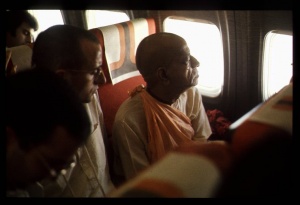CC Madhya 10.139

A.C. Bhaktivedanta Swami Prabhupada
TEXT 139
- sneha-leśāpekṣā mātra śrī-kṛṣṇa-kṛpāra
- sneha-vaśa hañā kare svatantra ācāra
SYNONYMS
sneha — of affection; leśa — on a trace; apekṣā — reliance; mātra — only; śrī-kṛṣṇa — of Lord Śrī Kṛṣṇa; kṛpāra — of the mercy; sneha-vaśa — obliged by affection; hañā — being; kare — does; svatantra — independent; ācāra — behavior.
TRANSLATION
“Lord Kṛṣṇa’s mercy is dependent only on affection. Being obliged only by affection, Lord Kṛṣṇa acts very independently.
PURPORT
Lord Śrī Kṛṣṇa, the Supreme Personality of Godhead, is merciful, but His mercy does not depend on mundane rules and regulations. He is dependent only on affection and nothing else. Service to Lord Kṛṣṇa can be rendered in two ways. One can serve the Lord in affection or in veneration. When service is rendered in affection, it is the Lord’s special mercy. When service is rendered in veneration, it is doubtful whether Kṛṣṇa’s mercy is actually involved. If Kṛṣṇa’s mercy is there, it is not dependent on any prescribed caste or creed. Śrī Caitanya Mahāprabhu wanted to inform Sārvabhauma Bhaṭṭācārya that Lord Kṛṣṇa is the spiritual master of everyone, and He does not care for mundane caste or creed. Therefore Śrī Caitanya Mahāprabhu cited the example of Lord Kṛṣṇa’s accepting food at the house of Vidura, who was a śūdra by birth. By the same token, Īśvara Purī, an empowered spiritual master, could show mercy to anyone. As such, he accepted Govinda, although the boy was born in a śūdra family. When Govinda was initiated, he became a brāhmaṇa and was accepted as Īśvara Purī’s personal servant. In the Hari-bhakti-vilāsa, Śrī Sanātana Gosvāmī states that one who is initiated by a bona fide spiritual master immediately becomes a brāhmaṇa. A pseudo spiritual master cannot transform a person into a brāhmaṇa, but an authorized spiritual master can do so. This is the verdict of śāstra, Śrī Caitanya Mahāprabhu and all the Gosvāmīs.